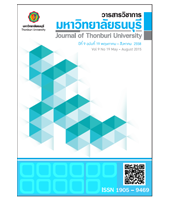รูปแบบวัฒนธรรมของสถานศึกษาระดับมัธยมศึกษา สังกัดสำนักงานคณะกรรมการการศึกษาขั้นพื้นฐาน
Keywords:
รูปแบบ, วัฒนธรรมของสถานศึกษาระดับมัธยมศึกษา, สำนักงานคณะกรรมการการศึกษาขั้นพื้นฐาน, Model, Secondary School Culture, The Basic Education CommissionAbstract
การวิจัยครั้งนี้ มีวัตถุประสงค์เพื่อ 1) ศึกษาและวิเคราะห์องค์ประกอบวัฒนธรรมของสถานศึกษา จากเอกสาร ตำราและงานวิจัยที่เกี่ยวข้อง 2) สร้างรูปแบบวัฒนธรรมของสถานศึกษาระดับมัธยมศึกษา 3) ตรวจสอบยืนยันรูปแบบวัฒนธรรมของสถานศึกษาระดับมัธยมศึกษาประชากรที่ใช้ในการวิจัยเป็นผู้เชี่ยวชาญที่มีความรู้ความสามารถในเรื่องวัฒนธรรมองค์การ จำนวน 19 คน ผู้บริหารสถานศึกษาและครูโรงเรียนมัธยมศึกษา จำนวน 110,092 คน กลุ่มตัวอย่างคือ ผู้เชี่ยวชาญด้านวัฒนธรรมองค์การและผู้ที่มีประสบการณ์ในการบริหารสถานศึกษาที่ให้ข้อมูลเกี่ยวกับองค์ประกอบและรูปแบบวัฒนธรรมของสถานศึกษา จำนวน 5 ท่าน ได้จากการเลือกแบบเจาะจง (Pureposive Sampling) ผู้เชี่ยวชาญร่วมที่ตอบแบบสอบถามเกี่ยวกับองค์ประกอบและรูปแบบวัฒนธรรมของสถานศึกษา จำนวน 14 ท่าน โดยใช้เทคนิคสโนว์บอล ผู้บริหารสถานศึกษาและครูโรงเรียนมัธยมศึกษา จำนวน 1,120 คน ได้มาโดยการสุ่มแบบชั้นภูมิ (Stratified sampling) เครื่องมือที่ใช้ในการวิจัยเป็นแบบสัมภาษณ์และแบบสอบถามมาตราส่วนประมาณค่า 5 ระดับ (Likert Scale) วิธีดำเนินงานวิจัยโดยใช้เทคนิคเดลฟาย (Delphi Technique) สถิติที่ใช้ในการวิเคราะห์ข้อมูลได้แก่ สถิติพื้นฐานและการวิเคราะห์องค์ประกอบเชิงยืนยัน (Confirmatory Factor Analysis) โดยใช้โปรแกรมลิสเรล (LISREL Program)
ผลการวิจัยสรุปได้ดังนี้ 1) รูปแบบวัฒนธรรมของสถานศึกษาระดับมัธยมศึกษามีองค์ประกอบหลัก 4 ด้านและมีองค์ประกอบย่อย 13 องค์ประกอบ 2) รูปแบบวัฒนธรรมของสถานศึกษาระดับมัธยมศึกษา มีความสอดคล้องกับข้อมูลเชิงประจักษ์อยู่ในเกณฑ์ดีแสดงว่าโมเดลการวัดรูปแบบวัฒนธรรมของสถานศึกษาระดับมัธยมศึกษามีความตรงเชิงโครงสร้าง 3) องค์ประกอบของรูปแบบวัฒนธรรมของสถานศึกษาระดับมัธยมศึกษา สังกัดสำนักงานคณะกรรมการการศึกษาขั้นพื้นฐาน มีความสอดคล้องกับข้อมูลเชิงประจักษ์ที่ได้จากกลุ่มตัวอย่าง c2 = 101.90, p = 0.000, RMSEA = 0.037, NFI = 1.00, CFI = 1.00, RMR = 0.012
SECONDARY SCHOOL CULTURE MODEL FOR THE OFFICE OF THE BASIC EDUCATION COMMISSION
The three objectives of the research were: i) to study and analyze the elements of secondary school culture compared to existing research and theories; ii) research a cultural model of secondary school in Thailand; and iii) verifya secondary school cultural model. The research sampleconsisted of 19 specialists knowledgeable in the culture of education organizations selected from 110,092 secondary school administrators and teachers inThailand. The sample consisted of people directly immersed in the culture of their organization andschool administrators. Five persons selected through purposive sampling provided information defining the cultural model of the school. Fourteen persons pilot tested the questionnaire regarding various factors and indicators of school culture by using snowball techniques. And one thousand and one hundred twenty school administrators and teachers selected through stratified sampling. The research methodology for data gathering include structured interviewscombined with theDelphitechnique to focus and validate the responses. A survey instrument using a five-point Likert scale was used to capture the data. Statistical processing of the data was done using fundamental statistic and confirmatory factor analysis using the LISREL structural equation modeling software.
The research results indicate: 1) Various models of culture in Thai Secondary Schools consist of 4 primary elements and 13 secondary elements. 2) The secondary school culture model in Thailandis congruent with school culture models described in global literature on the topic and is supported by empirical data. The outcome of measuring the culture model in secondary schools in Thailandcorrelates to the existing literature and research. 3) The elements of a secondary school cultural model in a School under the Office of the Basic Education Commission of Thailand, The results are relevant to empirical outcome from (c2 = 101.90, p = 0.000, RMSEA = 0.037, NFI = 1.00, CFI = 1.00, RMR = 0.012.







